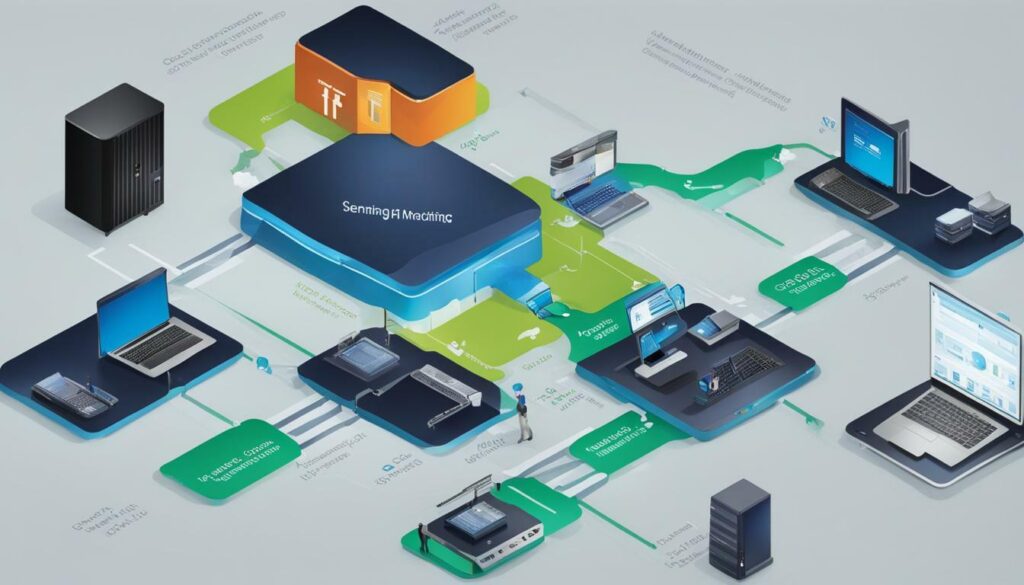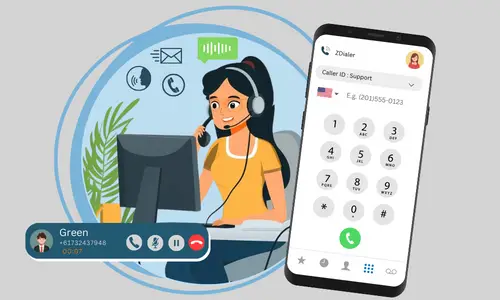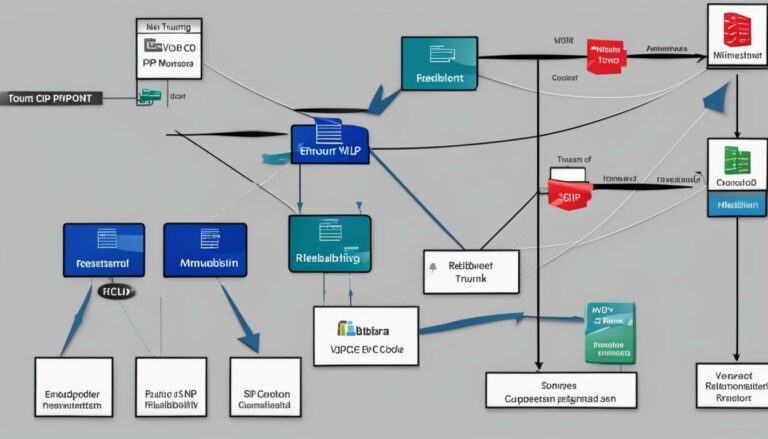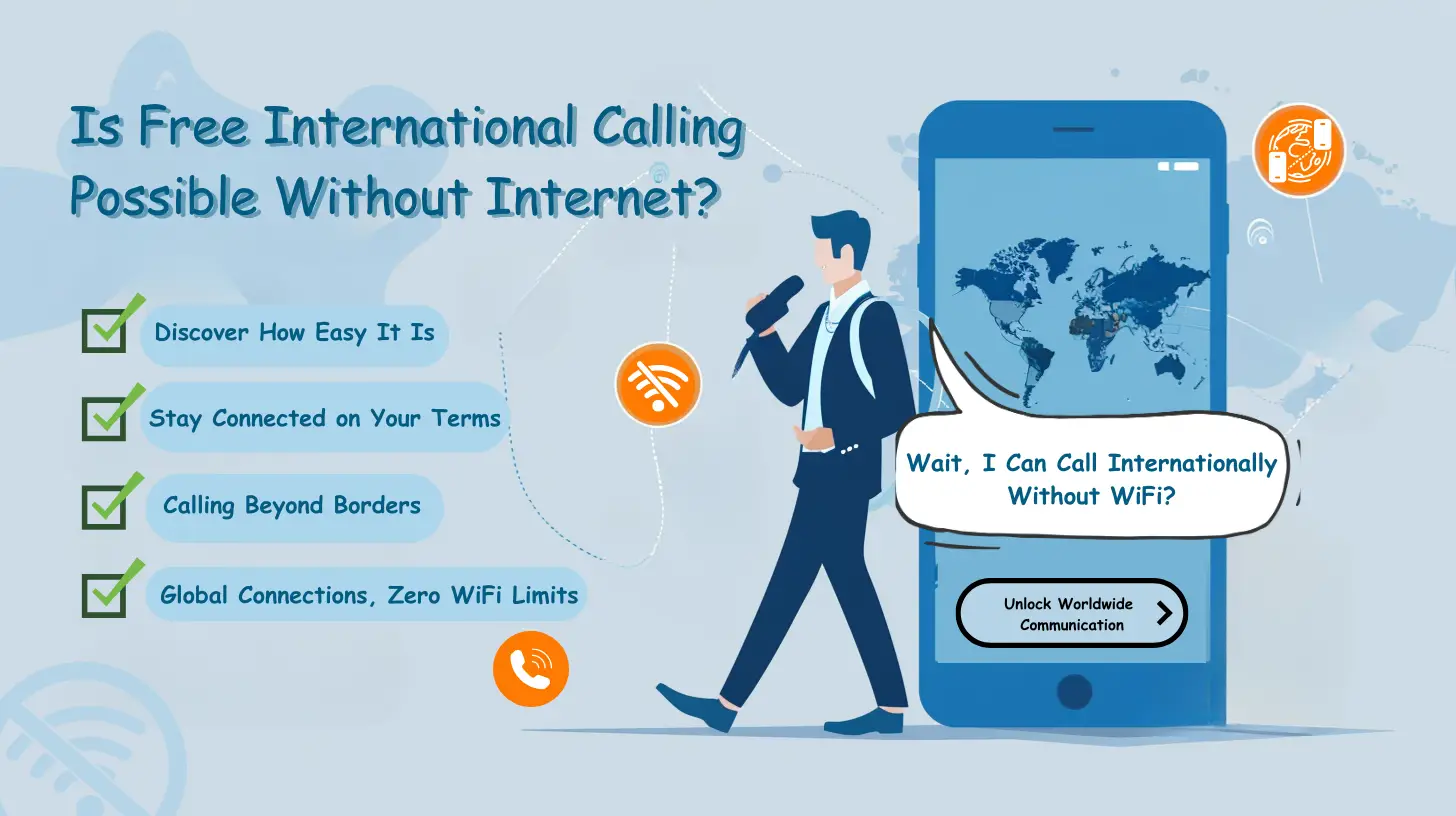SIP trunk routing is a fundamental aspect of VoIP communication that enables businesses to make and receive telephone calls over the internet instead of traditional phone lines. At My Country Mobile, we are here to guide you through the intricacies of SIP trunk routing and help you harness the power of VoIP communication.
VoIP, or Voice over Internet Protocol, has revolutionized the way businesses communicate. It utilizes the internet to transmit voice signals, allowing for more flexibility, cost savings, and advanced features compared to traditional phone systems. SIP trunk routing plays a crucial role in enabling seamless, high-quality voice communication over the internet.
With SIP trunk routing, businesses can create virtual lines or trunks that can transmit multiple signals simultaneously. This means that multiple calls can be made and received over a single internet connection, eliminating the need for physical phone lines and reducing costs. SIP trunk routing also offers scalability and flexibility, allowing businesses to adjust the number of channels in their SIP Trunk without any physical changes to the infrastructure.
Improved reliability is another advantage of implementing SIP trunk routing. It provides built-in redundancies and failovers, ensuring that communication is uninterrupted even in the event of network issues. SIP trunk routing also offers seamless integration with other business systems, such as customer relationship management (CRM) software and call analytics platforms, streamlining operations and enhancing productivity.
When choosing a SIP trunk provider, it is crucial to consider factors such as security measures, real-time analytics, disaster recovery features, interoperability, international coverage, and service level agreements. A reliable SIP trunk provider, such as Aircall, can handle the technical aspects of SIP trunking and provide a cloud-based solution with advanced features like softphone WebRTC technology.
Key Takeaways:
- SIP trunk routing enables businesses to make and receive telephone calls over the internet instead of traditional phone lines.
- It offers cost savings, scalability, flexibility, improved reliability, and integration capabilities.
- Choosing a reliable SIP trunk provider is crucial, considering factors like security measures, real-time analytics, and international coverage.
- Aircall is a trusted SIP trunking provider that handles the technical aspects and offers a cloud-based solution with advanced features.
- Switching to SIP trunking can simplify business telecom operations and enhance communication efficiency.
What is SIP Trunk Routing?
SIP trunk routing, also known as trunking in SIP, refers to the process of initiating and ending multimedia communication over the internet. It utilizes the Session Initiation Protocol (SIP), a signaling protocol that facilitates the establishment and management of real-time sessions encompassing voice, video, and messaging applications.
SIP trunking has become increasingly popular among businesses due to its ability to create virtual lines or trunks, enabling the transmission of multiple signals simultaneously. This is done by converting analog voice signals into digital signals and sending them over the internet using the SIP protocol.
By utilizing SIP trunk routing, businesses can enjoy several benefits. Firstly, it offers significant cost savings as internet-based calls tend to be cheaper than traditional phone lines, especially for long-distance and international calls. Additionally, SIP trunking provides scalability and flexibility, allowing businesses to adjust the number of channels in their SIP Trunk without the need for physical changes to the infrastructure. It also offers improved reliability with built-in redundancies and failovers. Lastly, SIP trunking can be seamlessly integrated with other business systems, streamlining operations and providing a more efficient communication experience.

SIP trunk routing offers a multitude of benefits for businesses seeking efficient and cost-effective communication solutions. Let’s explore some of the key advantages, including significant cost savings, enhanced scalability and flexibility, improved reliability, and seamless integration with other essential business systems.
First and foremost, implementing SIP trunk routing can result in substantial cost savings for businesses. By utilizing an internet connection instead of traditional phone lines, companies can significantly reduce their communication expenses, particularly for long-distance and international calls. SIP trunking allows for more affordable rates and eliminates the need for expensive hardware or separate telephone lines.
In addition to cost savings, SIP trunk routing offers enhanced scalability and flexibility. Businesses can easily adjust the number of channels in their SIP trunk without the need for physical changes to their infrastructure. This flexibility enables companies to scale their communication capabilities based on their needs, allowing for efficient growth and adapting to changing business requirements.
| Benefits of SIP Trunk Routing |
|---|
| Significant cost savings |
| Enhanced scalability and flexibility |
| Improved reliability |
| Seamless integration with other business systems |
Furthermore, SIP trunk routing offers improved reliability compared to traditional phone lines. With built-in redundancies and failover capabilities, businesses can ensure uninterrupted communication even in the event of network or system failures. This increased reliability minimizes the risk of missed calls or disruptions, ultimately enhancing overall business operations.
Lastly, SIP trunk routing seamlessly integrates with other essential business systems, streamlining operations and providing a cohesive communication experience. Integration with customer relationship management (CRM) systems, call center software, and other applications allows for efficient data sharing and enhances customer interactions. This integration capability enables businesses to optimize their workflows and improve productivity.
Overall, SIP trunk routing provides businesses with a cost-effective and efficient communication solution. With significant cost savings, enhanced scalability and flexibility, improved reliability, and seamless integration with other business systems, implementing SIP trunk routing can greatly benefit organizations of all sizes.

SIP trunking operates through an IP-enabled PBX system, which serves as the central hub for managing internal phone networks and handling incoming and outgoing calls. The SIP protocol facilitates communication, negotiates call parameters, and ensures the setup, duration, and termination of calls. Additionally, Quality of Service protocols and encryption mechanisms are employed to maintain voice quality and protect data security.
An IP-enabled PBX system converts analog voice signals into digital signals, which are then transmitted over the internet using the SIP protocol. This allows for the seamless transfer of voice, video, and messaging applications in real-time. SIP trunking enables businesses to create virtual lines or trunks that can carry multiple signals simultaneously, optimizing communication efficiency.
Quality of Service (QoS) protocols play a crucial role in ensuring optimal voice quality during SIP trunking. QoS protocols prioritize voice traffic over other types of data to minimize latency, packet loss, and jitter. This ensures clear and uninterrupted communication, especially in high-traffic situations.
Encryption for Data Security
Data security is of utmost importance in any communication system, and SIP trunking employs encryption techniques to safeguard sensitive information. Encryption algorithms protect voice and data transmissions, preventing unauthorized access or interception. By encrypting data at the source and decrypting it at the destination, SIP trunking ensures that communication remains secure and confidential.
| Key Points | Benefits |
|---|---|
| IP-enabled PBX system | Efficient management of internal phone networks |
| SIP protocol | Facilitates communication and call setup |
| Quality of Service protocols | Optimizes voice quality and minimizes latency |
| Encryption mechanisms | Secures data and protects against unauthorized access |
By understanding how SIP trunking works and the role of IP-enabled PBX systems, SIP protocols, Quality of Service, and encryption, businesses can make informed decisions about implementing this advanced communication technology. SIP trunking offers numerous benefits, including cost savings, scalability, and flexibility, improved reliability, and integration capabilities with other business systems. It is a powerful tool that can revolutionize VoIP communication and drive business growth.

SIP trunking connectivity offers an array of advantages for businesses, making it an increasingly popular choice. From significant cost savings to access to advanced features, enhanced security, and seamless integration capabilities, SIP trunking revolutionizes business communication.
One of the key benefits of SIP trunking is the potential for cost savings. By utilizing internet-based calls instead of traditional phone lines, businesses can reduce their communication expenses, particularly for long-distance and international calls. This cost effectiveness can significantly impact the overall budget and bottom line.
In addition to cost savings, SIP trunking provides access to advanced features that enhance communication capabilities. These features can include call forwarding, voicemail-to-email transcription, auto attendant, and more. Advanced features empower businesses to improve their productivity and customer service, ultimately driving success and growth.
Security is another critical advantage of SIP trunking. With encryption protocols in place, communication data is protected from unauthorized access, ensuring the privacy and integrity of sensitive information. This level of security is essential for businesses, particularly those operating in industries with strict compliance regulations.
Furthermore, SIP trunking offers seamless integration capabilities with other business systems. Whether it’s integrating with customer relationship management (CRM) software, unified communications platforms, or call center applications, SIP trunking facilitates smooth collaboration and streamlines operations. This integration allows for a more efficient and cohesive communication experience, benefiting both employees and customers.

By harnessing the power of SIP trunking, businesses can unlock a range of advantages that drive success in today’s fast-paced business landscape. From significant cost savings to advanced features, enhanced security, and seamless integration, SIP trunking transforms the way businesses communicate and collaborate.
| Advantages of SIP Trunking Connectivity |
|---|
| Cost savings |
| Access to advanced features |
| Enhanced security |
| Seamless integration capabilities |
Factors to Consider When Choosing a SIP Trunk Provider
Choosing the right SIP trunk provider is paramount for ensuring reliable and efficient communication. When evaluating potential providers, it is essential to consider factors such as security measures, real-time analytics, disaster recovery features, interoperability with existing infrastructure, international coverage, and service level agreements.
First and foremost, security measures should be a top priority when selecting a SIP trunk provider. Ensure that they have robust security protocols in place to protect your communication data from threats such as hacking or unauthorized access. Look for providers that implement encryption technology for secure transmission of voice and data.
Real-time analytics is another critical factor to consider. The ability to monitor and analyze call data in real-time can provide valuable insights into call quality, usage patterns, and network performance. This information can help you identify and address any issues promptly and optimize your communication system.
Disaster recovery features are essential for maintaining uninterrupted communication in the event of a network or system failure. Look for providers that offer redundancy and failover options to ensure high availability and reliability. This includes features such as automatic rerouting of calls to backup systems or alternate routes in case of an outage.
| Interoperability | International Coverage | Service Level Agreements |
|---|---|---|
| Check if the provider supports seamless integration with your existing infrastructure, including your IP-PBX system and other applications. This ensures smooth implementation and compatibility. | If your business operates globally or has international calling requirements, choose a provider with extensive international coverage. This ensures reliable and cost-effective communication across borders. | Service level agreements (SLAs) define the level of service and support you can expect from the provider. Evaluate the SLAs offered by different providers and ensure they align with your business needs and expectations. |
Summary:
- Security measures: Ensure the provider has robust security protocols and encryption technology.
- Real-time analytics: Look for providers that offer comprehensive monitoring and analysis of call data.
- Disaster recovery features: Choose a provider with redundancy and failover options for uninterrupted communication.
- Interoperability: Check if the provider integrates seamlessly with your existing infrastructure.
- International coverage: Consider a provider with extensive global reach for reliable international communication.
- Service level agreements: Evaluate the SLAs offered by providers to ensure they meet your business needs.
Considering these factors when choosing a SIP trunk provider will help you make an informed decision and ensure a reliable and efficient communication system for your business.

SIP trunking has emerged as the preferred solution for international calling, providing businesses with numerous advantages over traditional methods. With reduced costs, improved call quality, enhanced security, and the ability to consider carrier interconnection costs, SIP trunking presents a more efficient and cost-effective option for international communication.
By leveraging SIP trunk routing, businesses can significantly reduce their international calling expenses. Traditional phone lines can be expensive, especially for long-distance and international calls. SIP trunking utilizes internet-based calls, which are typically more affordable and can result in significant cost savings for businesses.
Besides cost savings, SIP trunking also offers improved call quality. With SIP trunk routing, businesses can enjoy high-quality voice calls over the internet. The use of SIP protocol and advanced voice compression techniques ensure that calls are clear and reliable, even for international communications.
Enhanced security is another advantage of using SIP trunking for international calling. SIP trunk providers implement robust security measures, including encryption, to protect communication data. This ensures that calls remain secure and confidential, especially important for businesses that handle sensitive information.
When considering carrier interconnection costs, SIP trunking proves to be a more cost-effective option. Instead of relying on physical telephone lines and multiple carriers, SIP trunking utilizes IP networks to transmit communication data. This eliminates the need for carrier interconnection costs, resulting in further savings for businesses.
| Advantages of SIP Trunking for International Calling |
|---|
| Reduced costs |
| Improved call quality |
| Enhanced security |
| No carrier interconnection costs |
With these advantages, it’s no wonder why businesses are increasingly turning to SIP trunking for their international calling needs. It offers a reliable and cost-effective solution that ensures high-quality communication while reducing expenses. By partnering with a reputable SIP trunk provider, businesses can take full advantage of the benefits that SIP trunk routing has to offer.

When deciding between SIP trunking and PRI for your business telecommunication needs, it’s important to understand the key differences and advantages of each. SIP trunking offers virtual presence, cost savings, scalability, flexibility, and integration capabilities that make it an appealing choice for businesses.
SIP trunking eliminates the need for physical presence in different locations, allowing businesses to establish a virtual presence without the costs and limitations associated with traditional phone lines. This virtual presence enables businesses to expand their reach and connect with customers and partners worldwide.
In terms of cost savings, SIP trunking offers lower line rentals and call charges compared to PRI. By leveraging internet connectivity, businesses can significantly reduce their communication costs, especially for long-distance and international calls.
Scalability and flexibility are also key advantages of SIP trunking. With SIP trunking, businesses can easily adjust the number of channels in their trunk without the need for physical changes to their infrastructure. This scalability allows businesses to accommodate fluctuations in call volume and adapt to changing business needs. Additionally, SIP trunking enables businesses to integrate their communication system with other technologies and systems, creating a seamless and efficient workflow.
| Advantages of SIP Trunking | Advantages of PRI |
|---|---|
|
|
While PRI offers established technology and reliable voice quality, it may be more suitable for businesses with high call volumes that require more control over call routing and prioritization. However, for businesses looking for virtual presence, cost savings, scalability, flexibility, and integration capabilities, SIP trunking is the preferred choice.
Overall, choosing the right solution depends on your specific business needs and priorities. Consider factors such as call volume, geographical presence, scalability requirements, and integration capabilities when making your decision. By evaluating these key factors, you can select the solution that best aligns with your business objectives and communication needs.

When it comes to selecting a reliable SIP trunking provider, look no further than Aircall. Aircall specializes in handling the technical aspects of SIP trunking and offers a comprehensive cloud-based solution that eliminates the need for desk phones. With their softphone WebRTC technology and Bring Your Own Carrier (BYOC) model, Aircall ensures quality coverage worldwide.
Aircall’s cloud-based solution revolutionizes the way businesses communicate, making it more flexible and scalable. By utilizing Aircall’s softphone WebRTC technology, companies can make and receive calls directly from their computer or mobile devices, freeing them from the limitations of traditional desk phones. This cloud-based approach offers businesses the flexibility to work from anywhere while maintaining the same level of professionalism and connectivity.
Moreover, Aircall’s BYOC model allows businesses to work with their preferred carriers, ensuring seamless integration and compatibility. With Aircall, businesses can take advantage of global carrier networks to ensure quality coverage worldwide. Whether it’s local or international calls, Aircall’s SIP trunking solution guarantees high-quality communication with minimal disruptions.
Join the growing number of businesses that are benefiting from Aircall’s expertise in SIP trunking. With their advanced technical capabilities, cloud-based solution, softphone WebRTC technology, and global connectivity through the BYOC model, Aircall provides a reliable SIP trunking solution that meets the communication needs of businesses of all sizes.

Making the switch to SIP trunking can be a game-changer for your business’ telecom operations. With the expertise and support of Aircall, the process is simplified, and all technical aspects are taken care of, allowing you to seamlessly transition to the advantages of SIP trunking.
SIP trunking enables businesses to make and receive telephone calls using an Internet connection instead of traditional phone lines. It utilizes Session Initiation Protocol (SIP), a signaling protocol used for initiating, maintaining, and terminating real-time sessions that include voice, video, and messaging applications. SIP trunking effectively means the process of initiating and ending multimedia communication over the internet, creating virtual lines or trunks that can transmit multiple signals at once.
SIP trunking has become popular due to several benefits, including:
- Cost savings: Internet-based calls can be cheaper than traditional phone lines, especially for long-distance and international calls.
- Scalability and flexibility: Businesses can adjust the number of channels in their SIP Trunk without physical changes to the infrastructure.
- Improved reliability: Built-in redundancies and failovers ensure better reliability.
- Integration with other business systems: SIP trunking can be integrated with other systems and technologies, streamlining operations and offering a seamless communication experience.
By switching to SIP trunking, businesses can streamline their telecom operations, reduce costs, and take advantage of advanced features and technologies. Aircall, as a trusted SIP trunking provider, offers a comprehensive solution that handles all the technical aspects of SIP trunking. Their cloud-based solution eliminates the need for desk phones and offers softphone WebRTC technology for voice transmission. Aircall works with the best providers through a Bring Your Own Carrier (BYOC) model, ensuring quality coverage worldwide.
| Advantages of Switching to SIP Trunking |
|---|
| Cost savings |
| Scalability and flexibility |
| Improved reliability |
| Integration with other business systems |
| Advanced features and technologies |
| Quality coverage worldwide |
Switching to SIP trunking with Aircall not only simplifies the process, but it also ensures that your business benefits from a reliable and efficient telecom solution.

In Conclusion: Harness the Power of SIP Trunk Routing for Superior VoIP Communication
SIP trunk routing holds immense potential for revolutionizing VoIP communication, making it more efficient and cost-effective for businesses. At My Country Mobile, we are committed to guiding you through the complexities of SIP trunk routing, while Aircall stands as a trusted provider ready to cater to your communication needs.
Implementing SIP trunk routing can offer numerous benefits for your business. It allows you to make and receive telephone calls using an internet connection, eliminating the need for traditional phone lines. Through the use of Session Initiation Protocol (SIP), multiple signals can be transmitted simultaneously, creating virtual lines or trunks.
With SIP trunking, you can experience cost savings, scalability, improved reliability, and integration capabilities. Internet-based calls can be cheaper than traditional phone lines, especially for long-distance and international calls. You can adjust the number of channels in your SIP Trunk without physical changes to the infrastructure, providing scalability and flexibility. Built-in redundancies and failovers ensure improved reliability, while integration with other systems streamlines operations.
To fully leverage the advantages of SIP trunking, it is essential to choose a reliable provider like Aircall. Aircall handles the technical aspects of SIP trunking and offers a comprehensive cloud-based solution with softphone WebRTC technology. Their expertise, along with a BYOC model and quality coverage worldwide, makes them a trusted partner for businesses.
Making the switch to SIP trunking is a significant step towards enhancing your business telecom operations. With My Country Mobile guiding you and Aircall providing top-notch services, you can harness the power of SIP trunk routing and enjoy superior VoIP communication.
























